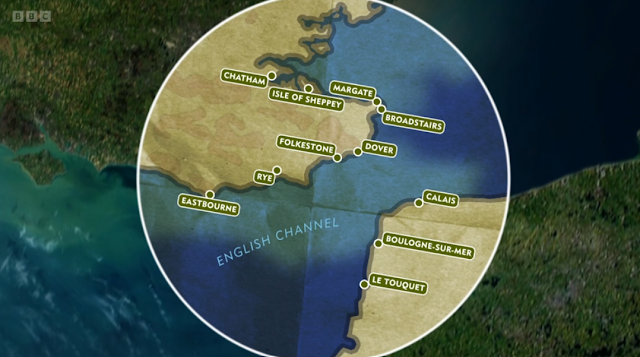It's been a big week for ghosts, hasn't it. First there was that discovery at Oxford University of the earliest known draft of Charles Dickens' seasonal classic, "A Christmas Carol", revealing that things weren't always meant to go Scrooge's way in his encounters with the ghosts like "Ghost of Christmas Past" etc.
14:00 Ensconced in bed for our afternoon nap today, Lois and I briefly discuss today's latest Dickens research breakthroughs. Scrooge has always been one of our favourite Dickens characters, and in 2013 we visited Scrooge's "gravestone" in a Shropshire churchyard.
Flashback to 2013: Lois and I visit Shrewsbury
and see Scrooge's fake "tombstone", made for the film,
in a churchyard in the middle of town
Our nap-time literary discussion this afternoon is brief, however, because, almost before we know it, my Samsung and Lois's Huawei begin to diddle and beep in joyous unison again under the bedclothes.
We've both set up our smartphones to "notify" us whenever one or other of our quora forum "favourite pundits" has been weighing in on some pet subject of ours.
Hurrah! It's been a couple of weeks since the last time, thanks to my recent hospital stay when my Samsung was forced to diddle away on its own in my lonely hospital bed. So it's nice today to be reassured that the mechanisms are both still in good working order, to put it mildly, and that our notification noises are still synchronised, thanks to our shared broadband link, which is nice!
And this afternoon we're delighted to see that Tadeusz Nusman (crazy name, crazy guy!), one of these beloved pundits of ours, has been weighing in again, ostensibly on the vexed subject of "Why is Polish so different from all the other Slavic languages?", but at the same time shedding light on another vexed subject "[Why Polish ghosts prefer to haunt non-Polish victims, especially if they live in Czech Republic or Slovakia]"
The fact is, as Tadeusz points out, "Old Polish is mutually intelligible with Modern Czech and Modern Slovak, but not with Modern Polish". So Polish ghosts from previous centuries can really "let their hair down" and speak freely with their Czech and Slovak victims or "hauntees", to use the technical term, without the use of interpreters. This is nice, because interpreters accompanying ghosts, however well-meaning they may be, are notorious for diffusing and diluting a lot of the feeling of horror that ghosts crave, nay demand, for their "manifestations".
"What's the use of trying to scare people when you have to bring an interpreter along with you?", many ghosts in Poland are saying, and understandably so!
What a crazy world we live in, though, don't we !!!!!
Poland's most haunted castle, at Niedzika
20:00 Today's been a relatively quiet day for Lois and me, so we've taken full advantage with a bit of a sleep-in in the morning and a leisurely afternoon nap, but tomorrow will be busy, with an early morning visit to talk to my physio on my post-operation exercise regime. Yikes !!!!!
We settle down tonight on the couch and wind down for an early bed with tonight's programme in ex-cabinet minister Michael Portillo's new series on "Great Coastal Railway Journeys".
This week Michael will be visiting seaside resorts and ports in the South East of England, as well as some in the north-east of France.
Michael's railway destinations this week
Overall another enjoyable episode in the series, slightly marred near Eastbourne by embarrassing pictures of Michael, at the site of the Battle of Hastings, talking to a local historian about the battle.
The historian, whose name is also Michael, is dressed in his normal clothes, but Michael Portillo is unfortunately seen dressed as an Anglo-Saxon soldier in King Harold's army - a big mistake, Lois and I feel, to put it mildly!
The two Michaels: ex-Cabinet Minister Michael Portillo (right) dressed as a soldier
in King Harold's Army, discussing the significance of the Battle of Hastings
Luckily, thanks to deft use of the Anglo-Saxon shield, the programme's director manages to protect viewers from having to see Michael's crotch, plus we can't tell whether his adrenaline is up or not, which is probably a good thing, Lois and I think!
And Lois and I didn't know that the Anglo-Saxon soldiers' battle-dress was so heavy with its chain-mail and all that malarkey, that soldiers could only fight for 15 minutes before having to stop for a break, and having to be replaced by a comrade, and also the fact that this battle went on for 9 hours. Yikes !!!!!
Lois and I like our historical "what if" questions, which we can't help bringing to mind during these documentaries.
It's well-known that there were actually 3 claimants to the English throne after King Edward the Confessor died in 1066: not just Harold, the Anglo-Saxon claimant, and William, Duke of Normandy, but also the Norwegian king, Harald Hardrada. The Anglo-Saxon army managed to defeat the Norwegians at the Battle of Stamford Bridge, but the battle severely weakened the army when they went on to face William at Hastings.
Harald Hardrada, King of Norway
What Lois and I wonder is - if William had landed in England a bit earlier, and been defeated, but then the exhausted Anglo-Saxons went on to be defeated by the Norwegians, what difference that would have made to subsequent English history.
It's well-known that William and his Normans, with their heavy-handed feudalism, set back the cause of democracy in England by several centuries. Would things have been better under the Norwegians?
I think we should be told, don't you! Answers on a postcard, please!
21:45 We go to bed - zzzzzz!!!!


















No comments:
Post a Comment